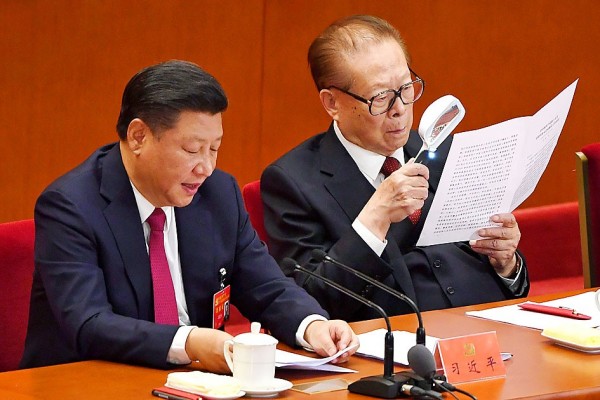《TAIPEI TIMES》 CCP enshrines Xi’s principles in constitution

Chinese President Xi Jinping, left, speaks as former Chinese president Jiang Zemin reads a document during the closing session of the Chinese Communist Party’s 19th National Congress at the Great Hall of the People in Beijing yesterday. Photo: AFP
POWER RESHUFFLE: One key ally to the president is expected to retire, while a number of front-runners for promotion were named as Central Committee members
/ Reuters, BEIJING
The Chinese Communist Party (CCP) yesterday enshrined Chinese President Xi Jinping’s (習近平) political thought into its constitution, putting him in the same company as Mao Zedong (毛澤東) and cementing his power ahead of a second five-year term.
However, a key Xi ally, Central Commission for Discipline Inspection Secretary Wang Qishan (王岐山), will not be on the CCP’s new Politburo Standing Committee, the apex of power in China, to be revealed today, as he was not among those named to the 204-member Central Committee yesterday.
Whether Wang would remain on the Politburo Standing Committee, which currently has seven members, despite being beyond the customary retirement age of 69 had been among the key questions to be answered at the CCP’s week-long 19th National Congress, which ended yesterday.
Wang could still assume another senior role over the next few months.
As expected, the party unanimously passed an amendment to include “Xi Jinping Thought on Socialism with Chinese Characteristics for a New Era” as one of its guiding principles.
The party is to announce its new Politburo Standing Committee, headed by Xi, at about noon today, culminating a five-yearly leadership reshuffle.
As expected, the amended constitution affirmed that Xi’s signature fight against corruption, which has ensnared more than 1.3 million officials, is to continue.
Unexpectedly, Xi’s “One Belt, One Road” initiative, an ambitious program to build infrastructure linking China with its neighbors and beyond, was also included in the party constitution.
Also included was a commitment to supply-side industrial reforms and giving play to the “decisive role” of market forces in resource allocation, a commitment Xi had made early in his first term that many investors have said he has failed to deliver on.
“The party exercises overall leadership over all areas of endeavor in every part of the country,” the CCP said in a statement reflecting Xi’s ongoing efforts to strengthen the party and its place in contemporary Chinese society.
If no clear successor to Xi is named to the Politburo Standing Committee, it would further fuel speculation that Xi might look to retain power beyond the customary second five-year term.
“This is about further erasing any distinction between Xi Jinping and the party,” said Jude Blanchette, who studies the CCP at the Conference Board’s Beijing-based China Center for Economics and Business. “Add on to this having supply-side structural reform and ‘One Belt, One Road’ written into this, which were Xi’s signature policies, this makes questioning or noncompliance with those tantamount to betrayal of the party.”
Xu Hongcai (徐洪才), deputy chief economist at the Beijing-based China Centre for International Economic Exchanges think tank, said party control was needed to push through the market reforms key to restructuring the world’s second-largest economy.
“To build a market economic system in such a big country, it’s impossible without the leadership of the party,” he said.
Others have argued that the two are contradictory.
“When you put ‘supply-side reform’ and ‘market playing a decisive role’ in the same document, then that just shows they have to almost choose one,” Aberdeen Standard Investments senior emerging markets economist Alex Wolf said in Hong Kong.
Xi rapidly consolidated power after assuming the party leadership in late 2012 and then the presidency the next year. The party gave Xi the title of “core” leader a year ago, a significant strengthening of his position.
Whether Xi was able to have his name “crowned” in the party constitution had been seen as a key measure of his power, elevating him to a level of previous leaders Mao and Deng Xiaoping (鄧小平).
No other leader since Mao has had an eponymous ideology included in the document while in office. Deng’s name was added after his death in 1997.
A list of 133 committee members for the Central Commission for Discipline Inspection released yesterday included Zhao Leji (趙樂際), who heads the CCP Organization Department, a strong sign that he will take over from Wang as anti-corruption chief.
China Banking Regulatory Commission Chairman Guo Shuqing (郭樹清) and Bank of Communications Ltd chairman Jiang Chaoliang (蔣超良), front-runners to succeed People’s Bank of China Governor Zhou Xiaochuan (周小川), both made it to the Central Committee.
新聞來源:TAIPEI TIMES


















